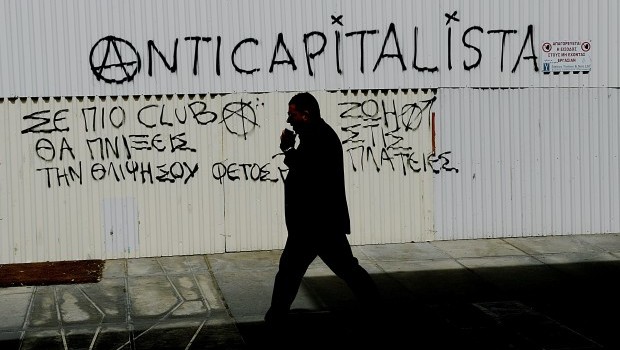
A man pass by anticapitalist graffiti in downtown Nicosia, Cyprus, 19 March 2013. The Cyprus parliament is set to vote 19 March on ratification of a one-off tax on bank deposits, following a postponement to allow for consultation. Source: EPA/FILIP SINGER
Unless parliament accepts the levy on deposits, EU countries say they will withhold a bailout, plunging one of the smallest European states closer to financial oblivion with potentially severe consequences for the rest of the troubled euro zone.
“The feeling I’m having is that the house is going to reject the bill,” President Nicos Anastasiades told reporters. Asked why, he added: “Because they feel and they think that it is unjust and it’s against the interests of Cyprus at large.”
Asked what he would do next, he said: “We have our own plans.”
Europe’s demand at the weekend that Cyprus break with previous EU practice and impose a levy on bank accounts as part of a 10 billion euro ($13 billion) bailout sparked outrage among Cypriots and unsettled financial markets.
Anastasiades refused to accept a levy of more than 10 percent on deposits above 100,000 euros, which meant taxing smaller accounts too. That hurts ordinary savers with deposits that they thought came with a state guarantee.
Stunned by the backlash and fearing rejection by Cypriot lawmakers, euro zone finance ministers urged Nicosia on Monday to avoid hitting accounts below 100,000 euros, and instead increase the levy on big accounts, which are unprotected by the state deposit-insurance system.
The European Union and International Monetary Fund are demanding Cyprus raise 5.8 billion euros to secure its bailout, needed to rescue its financial sector.
A revised draft bill seen by Reuters would exempt savings under 20,000 euros from the planned 6.75 percent levy on deposits of less than 100,000 euros. The government has not explained how it would fill the funding gap this would create.
French Finance Minister Pierre Moscovici said the euro zone could not lend Cyprus any more, since the country’s debt would become unmanageable.
“Above 10 billion euros we are entering into a size of debt that is not sustainable,” Moscovici told reporters in Paris.
It was not clear if the vote on the measure would even go ahead in the fractious 56-member parliament later on Tuesday, if leaders were sure it would be rejected.
The House of Representatives was expected to meet at 1600 GMT. Tuesday’s vote, originally planned for Sunday, has been postponed twice already. Three parties have said outright they will not support the tax, while a fourth, in the governing coalition, said it cannot support it as it stands either.
IMF Managing Director Christine Lagarde said in Frankfurt that the global lender supported Cyprus’s effort to achieve what she called “more progressive rates” in the levy on deposits.
Anastasiades continues to resist raising the levy on big deposits—many held by foreigners including rich Russians—fearing for the island’s banking business model and reputation as a safe haven.
He asked the EU for more aid during a telephone conversation with German Chancellor Angela Merkel on Monday, with a second call expected on Tuesday.
Government spokesman Christos Stylianides said Anastasiades may also speak to Vladimir Putin, the Russian president, who described the tax on Monday as “unfair, unprofessional and dangerous.”
Russia’s envoy to the EU likened the levy to a “forceful expropriation” that could wreck Cyprus’s financial system.
“When the banks open, people will rush to withdraw their deposits—that’s another threat—and then the whole banking system can collapse,” said Vladimir Chizov.
Cypriot Finance Minister Michael Sarris was due to hold meetings in Moscow on Wednesday, partly to try to get an extension to an existing 2.5 billion euro loan.
Russian authorities have denied rumors that the Kremlin might offer more money, possibly in return for a future stake in Cyprus’s large but as yet undeveloped offshore gas reserves, which have further raised the island’s strategic importance.
The divided east Mediterranean island, home to two large British military bases is a pawn in geopolitical rivalry.
An influx of Russian money and influence since the collapse of the Soviet Union has led some Brussels officials to complain privately that Cyprus acts at times as a “Trojan donkey” for Moscow inside the European Union.
Stunned Cypriots emptied cash machines over the weekend and banks are to remain shut on Tuesday and Wednesday to avoid a bank run. Hundreds of protesters rallied outside parliament on Monday, honking horns and holding banners saying “We are not your guinea pigs!”
“If they vote for this tax they will face the fury of the people,” said Markos Economou, a 47-year-old physics teacher and father of two. “The banks and the politicians should pay for this mess, not the people.”
The island’s stock exchange also suspended trading for another two days.
International market reaction has been muted so far but if a vote was lost, or postponed, that could change. The uncertainty saw the euro drop 0.2 percent as it remained near a three-month low and European shares fall 0.4 percent in early trade.
While Brussels has emphasized that the measure is a one-off for a country that accounts for just 0.2 percent of European output, fears have grown that savers in other, larger European countries will be spurred to withdraw funds.
